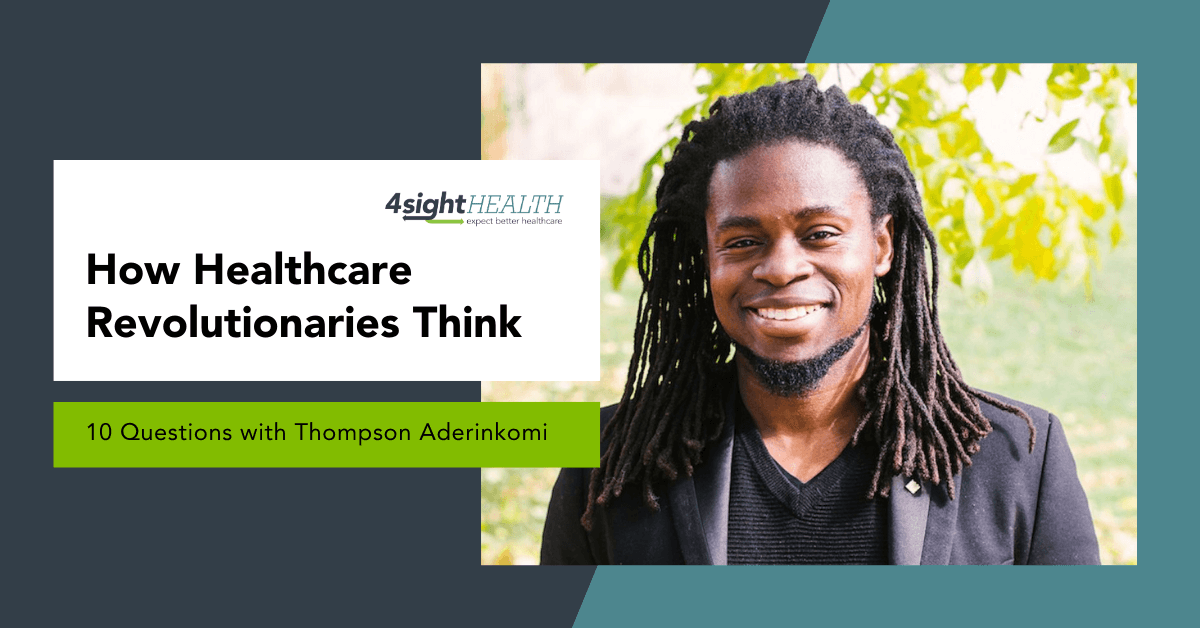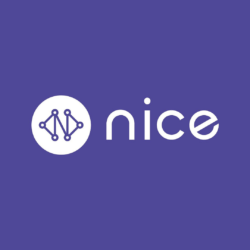March 25, 2021

How Healthcare Revolutionaries Think: 10 Questions with Thompson Aderinkomi
Welcome to the second installment of 4sight Health’s new monthly interview series, How Healthcare Revolutionaries Think. The interview series features healthcare instigators who believe that outcomes matter, customers count and value rules.
I met Thompson Aderinkomi in June 2014 in Minneapolis at the third stop on McKesson’s cross-country Better Health Tour of one-day health innovation events. If you’ve gone to any intimate conferences with 100 to 200 people, there always are three or four people who are surrounded by other attendees at all the breaks between sessions. Aderinkomi is one of those people. If you meet him, you’ll know why.
What I like about Aderinkomi is that he says the quiet parts about healthcare out loud. My favorite: “The problem with healthcare is the price.”
A serial entrepreneur, Aderinkomi co-founded his fourth healthcare start-up company, Nice Healthcare, in October 2017, where he is the CEO.
We asked Aderinkomi about why he does what he does, the lessons he learned along the way and his vision of how the healthcare system should work for patients.
1. What do you remember about using the healthcare system as a child through young adulthood and the impressions those experiences made on you?
Aderinkomi: Whether I was in elementary school, middle school or high school, what I remember was that going to the doctor was a big deal whether it was a wellness visit or a sick visit. It was usually my mom who took me. It was very time consuming. And there was a lot of waiting. Waiting in the waiting room. Waiting in the exam room. And not spending that much time with the doctor. In high school, I distinctly remember picking up on this idea that you don’t pay for healthcare the same way you pay for other things. I noticed that money didn’t change hands when we saw the doctor. I didn’t know why at the time. I was just in high school.
2. You have degrees in economics, statistics and business administration from the University of Minnesota. What did you learn in college and graduate school that shaped how you think about healthcare?
Aderinkomi: I can’t claim to have made any insights into healthcare while I was at the U. It wasn’t until after I was finished and a few years into my career did the things that I learned as an undergrad and graduate student start to make more sense and inform my framework of how I think about healthcare.

3. How did you apply your economics, statistics and business administration lessons to healthcare?
Aderinkomi: Well, first, most economic theories don’t apply in healthcare. Most customers don’t have a choice of where they buy healthcare services, and most don’t know the price of what they have to buy before they buy it.
As for statistics, what I realized is that healthcare is full of people who don’t know anything about statistics. They use them incorrectly or use them incorrectly on purpose to perpetuate and sustain the status quo.
With my MBA, I realized that most healthcare businesses are poorly run or are very well run but with the intent of extracting more value for themselves than the value they create for their customers. I think a lot of healthcare right now is corrupt. It’s abusive. It’s extractive. It’s not what the industry needs right now, and it’s certainly not what patients need right now.
4. When you combine your personal experiences with healthcare with the lessons learned from your education, what’s your vision of how the healthcare system should work for customers?
Aderinkomi: I guess I would boil it down to three frameworks. The first is, there are parts of healthcare in which we do have a choice. Where we get primary care. Where we have elective surgery. Where we fill and buy our prescriptions. We should take health insurance out of this framework and apply free-market concepts to make it work. Everyone in this space should compete on convenience. They should compete on price. And they should compete on quality. Just like any other normal business.
5. What’s going on in your second framework?

Aderinkomi: In the second framework are the parts of healthcare in which we don’t have a choice. You were born with a medical condition. You were diagnosed with an acute or chronic medical condition. You were in an accident. You don’t have a choice of what happened to you. And you don’t have a choice of shopping for a doctor or hospital to care for you. I believe everyone has the right to the best possible care in those situations. It’s a public good that should be paid for by the government just like you would pay for a park or a road. The free market should not control that. And neither should health insurance companies. They would get in the middle and mess the situation up.
6. I can’t wait to hear about what’s happening in your third framework.
Aderinkomi: Like I said, no health insurance is involved in framework one and two. But health insurance is involved in the third. People should be allowed to buy health insurance on their own to help cover the cost of the choices they make in framework one. This is where health insurance actually could be useful. Let’s say you can’t afford to pay 100 percent of the free-market price for a primary-care visit or elective surgery or a prescription drug. Insurance here would help cover a portion of the price. It would be your choice to buy health coverage. And health insurance would be separated from employment. By doing that, health insurers would be competing against themselves to sell coverage directly to consumers.

7. Let’s shift gears a bit and talk about the four companies you’ve founded: RetraceHealth, Healthcare Minnesota, Relate and now Nice Healthcare. Why try to change healthcare from outside when you can join an existing company and try to change healthcare from the inside?
Aderinkomi: Incumbents cannot and will not change healthcare. They have no true incentives. They’re telling themselves lies. They’re deluding themselves into thinking that they’re actually going to change healthcare. Why would you do something that’s going to pay you less? Why would you do something that could put you out of business? That’s why I would never join an incumbent company to change healthcare. They don’t have any incentive to do so.
8. What advice do you have for an incumbent healthcare company that truly does want to change how the system works?
Aderinkomi: If they were serious, they would decrease the annual salary of any nonclinical staff person making more than $150,000 by the same percentage that national health expenditures increased the previous year. You’d only get an increase in salary if healthcare spending went down. That’s all you’d have to do. You’d see instant, 24-hour change in healthcare. That’s why I choose to start my own companies. We exist to lower the cost of healthcare while simultaneously making it more convenient and by providing higher quality care and service. We don’t have any baggage or incentives or hooks not to do so.
9. What did you learn at each of your startups that you applied to the next startup?
Aderinkomi: With my first company, I learned that timing is everything. We were doing something that no one thought needed to be done. Now 10 years later, everyone is doing it. With my second company, I learned that in healthcare, the customer doesn’t always know what’s right. In that case, the customer wasn’t the patient but the payer. Payers don’t always have the patient’s best interest in mind. With my third company, I learned to choose your partners wisely when it comes to investors. They can stymie your efforts to change healthcare when the money comes with lots of strings attached. So far, I’ve been able to avoid those three mistakes with my fourth company. That’s one of the reasons we’re succeeding and doing so well right now.
10. Tell me about the people you want to work with as co-founders and partners or as employees. What do you look for? What’s your litmus test?
Aderinkomi: This is going to sound strange, but I don’t look for people who are off-the-charts passionate about healthcare. Those people are far and few between. They’re rare. And they border on insanity. I look for people who want to make the world better by being passionate about whatever they’re doing. It doesn’t matter what it is. Their family. A sport. A craft. A hobby. I also look for people with common sense. These are the people who can make complicated things simple. They’re also the people who don’t make things more complicated than they have to be. They don’t overthink things. They don’t need a 20-slide PowerPoint deck to explain things. They can just get it done.
4sight Health would like to thank Thompson for his candor and his willingness to share his revolutionary healthcare ideas with our audience. Watch for him at your next healthcare conference.
Thompson Aderinkomi, CEO of Nice Healthcare
 Thompson Aderinkomi is currently co-founder and CEO of Nice Healthcare, a technology-enabled primary care clinic that delivers all care in the comfort of the patient’s home and contracts directly with small employers. He also co-founded RetraceHealth in 2013 a direct primary care medical practice, a company that went on to raise over $7 million. In April of 2013, Minnesota Governor Mark Dayton appointed Thompson to the inaugural board of directors for MNsure, the MN Health Insurance Exchange. Also in 2013 Thompson, co-founded Healthcare.mn, the Twin Cities’ premier organization for healthcare entrepreneurs, which has grown to over 2,000 members. From the University of Minnesota, Thompson has earned a B.S. in Economics, an M.S. in Statistics and an MBA from the Carlson School of Management. He has been married for 16 years and has two young sons.
Thompson Aderinkomi is currently co-founder and CEO of Nice Healthcare, a technology-enabled primary care clinic that delivers all care in the comfort of the patient’s home and contracts directly with small employers. He also co-founded RetraceHealth in 2013 a direct primary care medical practice, a company that went on to raise over $7 million. In April of 2013, Minnesota Governor Mark Dayton appointed Thompson to the inaugural board of directors for MNsure, the MN Health Insurance Exchange. Also in 2013 Thompson, co-founded Healthcare.mn, the Twin Cities’ premier organization for healthcare entrepreneurs, which has grown to over 2,000 members. From the University of Minnesota, Thompson has earned a B.S. in Economics, an M.S. in Statistics and an MBA from the Carlson School of Management. He has been married for 16 years and has two young sons.
Read more healthcare revolutionary interviews here.
“How Healthcare Revolutionaries Think: 10 Questions with Gaurov Dayal, M.D.”





